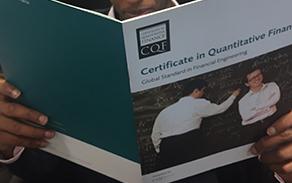Fast-Track Your Career with a Machine Learning Finance Course
Image

Text
Technological innovation has always played an important role in the evolution of the financial markets, from the first cable transmissions across the Atlantic Ocean in the mid-1800s to the high-frequency trading systems of today. As part of the computerization of the financial industry, artificial intelligence (AI) in finance first emerged in the 1970s, with the development of expert systems deployed by firms like American Express.
These days, AI and machine learning in finance and accounting is being applied widely, for asset and market analysis, trade automation, portfolio optimization, risk management, and legal measures such as fraud detection and compliance.
In the context of quantitative finance, machine learning is being used to augment existing approaches to signal detection, strategy testing, portfolio management, and performance analysis. Extensive research conducted by major investment banks and hedge funds has explored how time series analysis and traditional quant trading strategies can be enhanced through machine learning methods. That exploration has continued, with many articles and papers being published in finance journals, media outlets, and publishing platforms such as SSRN. See The Evolution of Machine Learning in Quantitative Finance for a brief discussion of topics and key trends.
So, machine learning is clearly a hot topic, but what does this mean for job seekers?
How could the rise of machine learning in finance and accounting impact your career?
According to recruiters who specialize in quant finance placements, the demand for people with skills in data science and machine learning is very strong. Traditional quant capabilities in math and programming are also in demand, but a qualification that takes the machine learning revolution into account resonates very well with today’s employers.
As the quant toolkit is adapting to market needs, data science, machine learning, and Python are essential. For programmers already proficient in languages such as Python, or C, it is worth noting that C# is also seeing a resurgence, particularly as related to the implementation of trading strategies.
The quant landscape is vast and there are many career directions to choose from. While employees can often learn quite a bit on the job, a strong machine learning finance course can provide depth and focus for those who want a more structured and sustained dive on key topics.

The CQF – an online machine learning finance course
If you are considering a machine learning finance course, then a strong option is the Certificate in Quantitative Finance (CQF). The CQF is the world’s largest professional qualification in quantitative finance. Geared towards those either working in finance already, or aspiring to do so, the CQF features a cutting-edge syllabus that is updated quarterly in consultation with senior alumni practitioners and faculty to ensure that delegates learn the essential quant finance and machine learning skills being used in today’s financial markets. The CQF modules include:
- Building Blocks of Quantitative Finance
- Quantitative Risk and Return
- Equities and Currencies
- Data Science and Machine Learning I
- Data Science and Machine Learning II
- Fixed Income and Credit
The program begins with a series of optional primers on math, finance, and programming before continuing through the six modules listed above. The classical tools and techniques of quant finance from the Black Scholes model onwards, are described and critiqued in each module. The machine learning modules cover various types of machine learning: supervised, unsupervised, reinforcement, and deep learning. Alongside the core content for each module, students also have access to course notes, additional recommended reading, Python Labs, and tutorials.
Toward the end of the course, delegates complete a final project as part of the program requirements. Many CQF alumni have reported how valuable the project was in helping them think through the lectures and produce a solid piece of research and programming that can be discussed in interviews or can be expanded on in a current job.
This practical focus is unique to the CQF program. Throughout the CQF, students are taught both the theory and the practical implementation of techniques and models to ensure they can apply these to real-world scenarios. The CQF faculty is also made up of some of the world’s leading practitioners who are able to draw on their own industry experience when teaching.
The program is delivered online and available on demand, enabling students to watch the lectures at a time that works best for them. The CQF is also part-time, allowing delegates to continue a full-time career alongside their studies. The program can be completed in just six months or, if necessary, students can defer for up to three years at no extra cost.
After completing the program, CQF alumni are able to keep their skills competitive for the rest of their careers through permanent, free access to the Lifelong Learning library which includes a wide range of additional lectures, masterclasses, and the latest CQF program content. They also join a global CQF community of quant professionals.
Next steps
Artificial intelligence and machine learning will continue to influence the shape of the financial markets for years to come. As a program that sits squarely at the intersection of math, finance, and programming, the CQF is a unique machine learning finance course that includes a comprehensive syllabus, covering the essential quant finance and machine learning techniques used in the markets today.
For further information, watch a sample lecture on machine learning and predictive analytics or download the CQF brochure to learn more about the program.



